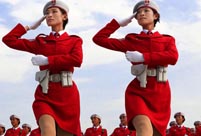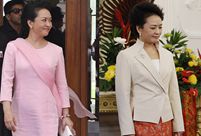 Bikini show in 2014 China Final of Miss Tourism World
Bikini show in 2014 China Final of Miss Tourism World
 Close-up view of August Aerobatic Team
Close-up view of August Aerobatic Team
 Goddesses married in 2014
Goddesses married in 2014
 Polar region photos raise worldwide awareness of global warming
Polar region photos raise worldwide awareness of global warming
 Get off at the last stop — Beijing Subway in vision
Get off at the last stop — Beijing Subway in vision
 Top 100 beauties in the world!
Top 100 beauties in the world!
 Gallery: Who is the most beautiful one?
Gallery: Who is the most beautiful one?
 If you like autumn, put your hands in the air!
If you like autumn, put your hands in the air!
 Fan Bingbing's "Queen style" in new play
Fan Bingbing's "Queen style" in new play
 Lingerie show at 2014 Miss China
Lingerie show at 2014 Miss China
The 59 percent turnout shows that at least 20 percent of voters had consciously "voted with their feet". The essential feature of Japan's election is still Abe's war for power.
The curtains closed on Japan's 47th upper house election at 8 pm on Dec. 14. The Liberal Democratic Party and the New Komeito Party have a very big chance of taking more than two thirds of the seats. If the Liberal Democratic Party takes 300 seats, Abe will win another term of office.
However, the low voter turnout says a great deal about Abe's promising success. By 2 pm on election day, only 23 percent of the electorate had voted. No one showed up early to queue for their vote. By 7 pm, overall voter turnout was only 59 percent, which means 2 out of 5 voters did not vote. 59 percent is the lowest turnout in Japan since WWII.
How to explain the fact that so many people did not vote? A 100 percent voter turnout is impossible due to technical and personal issues. However, these minor factors would never cut the vote by so much as 10 percent. The 59 percent turnout shows that at least 20 percent of voters had consciously "voted with their feet" to silently boycott Abe's action of dissolving parliament and bringing on an early election.
That voters are losing faith in Abe's Liberal Democratic Party, while they still have no confidence in its opponents, might be the most accurate explanation for this phenomenon.
Abe's early election this year was in fact a referendum on "Abenomics". Japan's GDP shrunk in the third quarter by 0.4 percent - 1.6 percent annualized - meaning that it had fallen for two quarters in a row. Facing these pessimistic numbers, Abe’s strategy of bringing up an early election seemed rather imprudent.
The essence of the early election remains Abe's war for power. By having an early election, Abe hoped to expand his strength in parliament, and secure an advantageous position in the election of his own Party. As long as there are no unforeseen setbacks in the 2016 senate election, Abe can now plan to govern all the way to the year 2018. With the failure of his Abenomics, Abe is turning ever more to ring-wing historical revisionism. The question now is whether Abe will become the man who put an end to Japan's "pacifist constitution".
This article is edited and translated from 《选民用脚投票安倍赢了又如何》,source: Beijing News, author: He Jingyun
 Beautiful Chinese woman
Beautiful Chinese woman 20 years on: Relocated Three Gorges residents through lens
20 years on: Relocated Three Gorges residents through lens PLA HK Garrison veterans leave behind beautiful smiles
PLA HK Garrison veterans leave behind beautiful smiles Chestnut girl goes viral online
Chestnut girl goes viral online Representative beauties
Representative beauties Victoria's Secret Fashion Show
Victoria's Secret Fashion Show Excellent photos of Zhuhai Air Show
Excellent photos of Zhuhai Air Show In photos: Bright and brave female soldier of PLA
In photos: Bright and brave female soldier of PLA China's charming first lady
China's charming first lady Disrespecting memorial days crosses a line
Disrespecting memorial days crosses a line More efforts needed in ITA talks: experts
More efforts needed in ITA talks: experts China’s burgeoning pageant industry a mess
China’s burgeoning pageant industry a mess South Korean educator brings positivity campaign to China’s Internet
South Korean educator brings positivity campaign to China’s InternetDay|Week|Month